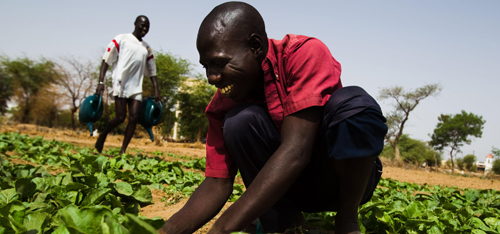Guinea
Farmers in Guinea largely engage in subsistence agriculture, growing crops on small plots of land to feed themselves and their families. Yet inadequate infrastructure and poor access to agricultural extension services, technologies and inputs, undermine potential productivity. The demand for food outstrips domestic production, forcing the country to turn to international food markets to fill the gap.
A devalued currency coupled with soaring food prices during the late 2000s pushed even more people into poverty and hunger. The Guinean franc began to stabilize in 2012, driving down inflation and lowering food prices, though chronic food insecurity and malnutrition persist in parts of the country, especially in western and southern regions.
IPPM programme in Guinea
Political strife in Guinea delayed the start of programme activities, which only got under way in three districts of the country in 2010. The programme, in line with the national policy for agricultural development, aims to boost agricultural productivity through community based education, leading to improved practices and sound resource management.
IPPM’s overall objective in Guinea is to build the capacity of farmers to adopt improved agronomic practices and to produce food sustainably, both for household consumption and the local market. Helping farmers to understand the importance of using balanced fertilization methods is a significant component of the programme, as is the campaign to raise awareness of the impact of pesticides on human health and the environment.
The programme has trained farmers on agricultural practices such as field preparation, use of certified seed, crop spacing and irrigation to help them get more from their land. Additionally, capacity development activities have focused on marketing skills to help farmers and their families increase their revenue.
To date, the IPPM programme in Guinea has trained 1 869 farmers, 78 percent of them women, on rice and vegetable production via a network of farmer field schools.
IPPM projects in Guinea
- POPs reduction in Niger and Senegal Rivers (regional)
Partners
The IPPM programme works with several partners to achieve its goals in Guinea, namely: Agence nationale de la promotion rurale et du conseil agricole; Centre de recherche agronomique de Bordo; Directions préfectorales de l’agriculture; and the federations of rice and vegetable producer unions.
FAO appreciates the support provided to this programme, including: Global Environment Facility and United Nations Environment Programme.

